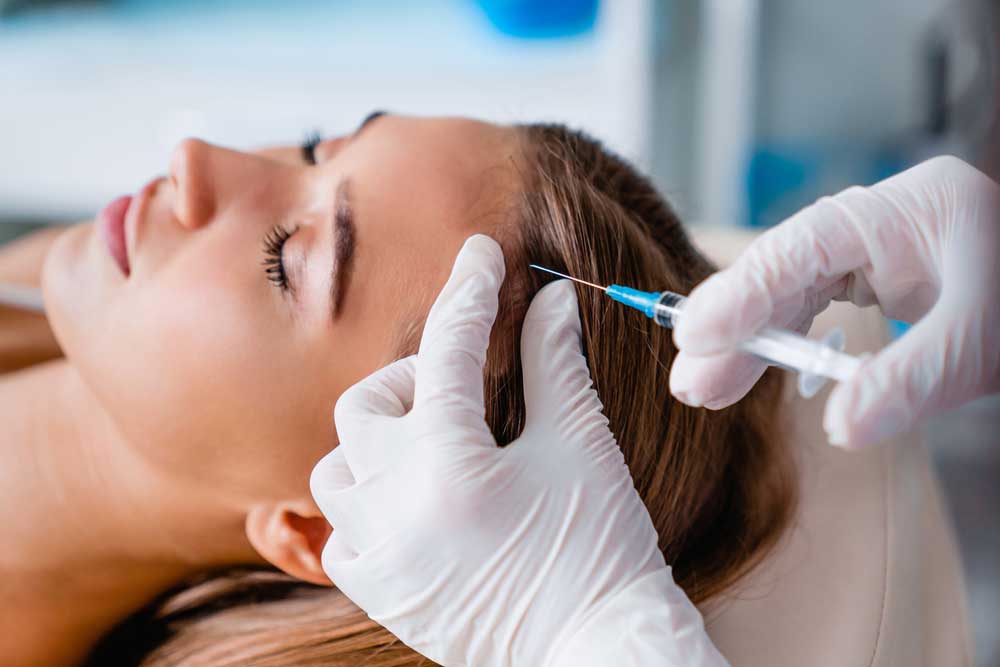Hair loss is one of the negative effects of weight loss in some circumstances. Nutrient deficiencies, stress, and hormonal shifts due to rapid weight loss, restrictive diets, or weight loss surgery can cause this negative reaction. This article discusses how hair loss is linked to weight loss and methods to treat and prevent the issue.
Can Hair Loss Occur After Weight Loss?
Nutrient deficiencies and the other consequences resulting from rapid weight loss can have on your body are major causes of hair loss during weight loss. A disorder known as acute telogen effluvium (TE), one of the most prevalent causes of extensive hair loss on the scalp, has been linked to abrupt weight reduction and restrictive diets. TE usually begins three months after a triggering event, such as fast weight loss, lasting for around six months. Androgenic alopecia, often referred to as male or female pattern baldness, is a kind of TE that lasts more than six months.
Causes of Hair Loss Related to Weight Loss
Here are some significant ways how weight loss can impact your hair health:
- Crash dieting: Hair loss has been associated in numerous studies with rapid weight loss, calorie restriction, dietary deficits, and psychological stress, all of which are frequent in crash dieters. According to a study on 180 women with diffuse hair loss, the most common reasons for hair loss were iron deficiency and psychological stress. In eight study subjects, crash diets were also the reason. Crash diets can cause a shortage of certain vital fatty acids along with a deficit of zinc, protein, and calories, resulting in hair loss.
- Low protein diets: Protein malnutrition can result in hair loss. Specific amino acid deficits, such as histidine, leucine, valine, and cysteine, are frequent in those who lose their hair. When your protein demands aren’t satisfied, your body prioritizes key protein-dependent tasks, including tissue repair, digestion, pH and water balance maintenance, and hormone production.
- Weight loss surgeries: Weight loss surgery is linked to rapid weight loss and frequently results in protein, vitamin, and mineral shortages, leading to hair loss. In a study conducted in 2020 on 112 females who had undergone sleeve gastrectomy, 72% of subjects were found to be facing hair loss after surgery.
- Restrictive diets: Restrictive diets that eliminate entire food groups, like crash diets, can induce hair loss due to nutrient deficit or stress. Hair loss has been linked to iron, zinc, protein, selenium, and essential fatty acid deficiencies. Hair loss has been linked to major stress, which is sometimes associated with restrictive eating.
See Also: Is Green Tea Good for Your Hair Growth?
Is Hair Loss Dangerous?
Hair loss isn’t dangerous in and of itself, but the underlying causes of hair loss after losing weight can be. Nutrient deficits and extreme calorie restriction, for example, can cause serious health problems such as iron deficiency anemia, muscle loss, etc. Iron deficiency anemia can cause hair loss, reduced brain function, infertility, heart issues, depression, and immune system dysfunction.
Hair loss can also be caused by other medical disorders, such as autoimmune diseases. Therefore, if you’re suffering hair loss, you should speak with your physician because it could not be related to weight loss.
Preventing Hair Loss When Trying to Lose Weight
Nutrient deficits or rapid weight loss might cause hair loss while losing weight. Therefore, you must work toward a healthy, long-term weight loss goal. Crash and restrictive diets can be harmful. If you follow a dietary pattern that prohibits many foods, such as a vegetarian or vegan diet, incorporate nutrient-dense foods and supplement with nutrients your diet lacks.
If you’re having weight reduction surgery, make sure to have and take adequate zinc, iron, and vitamin B12 levels before the procedure. Then, supplement with nutrients suggested by your doctor or dietician following the surgery. This may help to reduce hair loss as a result of surgery.
Facilitate Hair Regrowth
If a deficit in one or more nutrients, such as zinc or iron, is causing hair loss, treating the deficiency or deficiencies may stop the loss and lead to hair regrowth. If your body isn’t getting enough calories or nutrients from a restrictive or crash diet, it’s critical to cease the diet right once and start fueling it properly with a balanced diet rich in nutrient-dense foods.
See Also: What nutrient deficiencies generally cause hair loss?
If you are dealing with massive hair loss during your weight loss journey, visit us at New Jersey Hair Restoration Center. We offer the best treatments, experienced staff, and renowned doctors. At NJHRC, we have Dr. Emil Shakov, is the best hair transplant doctor in NJ, who can treat most hair loss problems effectively.


